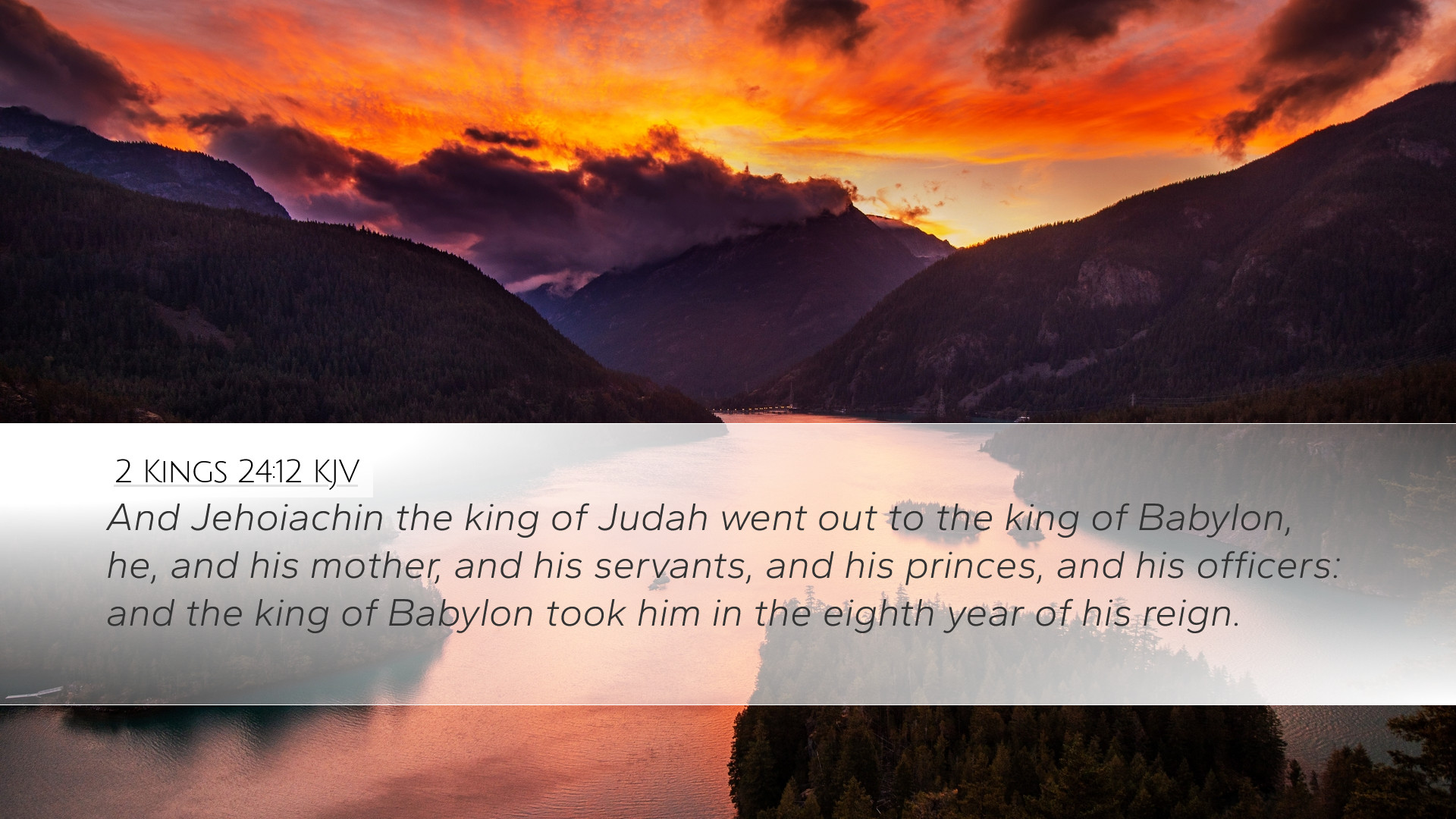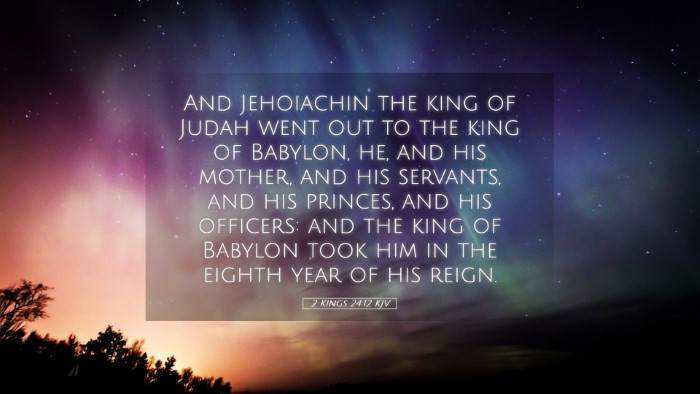Old Testament
Genesis Exodus Leviticus Numbers Deuteronomy Joshua Judges Ruth 1 Samuel 2 Samuel 1 Kings 2 Kings 1 Chronicles 2 Chronicles Ezra Nehemiah Esther Job Psalms Proverbs Ecclesiastes Song of Solomon Isaiah Jeremiah Lamentations Ezekiel Daniel Hosea Joel Amos Obadiah Jonah Micah Nahum Habakkuk Zephaniah Haggai Zechariah Malachi2 Kings 24:12
2 Kings 24:12 KJV
And Jehoiachin the king of Judah went out to the king of Babylon, he, and his mother, and his servants, and his princes, and his officers: and the king of Babylon took him in the eighth year of his reign.
2 Kings 24:12 Bible Commentary
Commentary on 2 Kings 24:12
Verse: "And Jehoiachin the king of Judah went out to the king of Babylon, and the king of Babylon gave him in the eighth year of his reign." (2 Kings 24:12)
Introduction
This verse marks a significant moment in the history of Judah and its monarchy. Jehoiachin’s submission to King Nebuchadnezzar of Babylon represents the culmination of a series of events leading to the Babylonian exile. Various commentaries on this passage explore its theological, historical, and spiritual implications.
Historical Context
In the context of 2 Kings 24, Judah is facing dire circumstances due to the prophetic warnings that had been continually neglected. The reform movements of earlier kings had failed to restore true worship, and external pressures from Babylon had escalated. Jehoiachin’s reign, which lasted only three months, signifies the loss of autonomy and the impending judgment upon Judah.
Matthew Henry's Insights
Matthew Henry emphasizes the theme of divine judgment present throughout these historical accounts. He suggests that Jehoiachin’s act of surrender reveals the consequences of a nation that has turned its back on God.
- Divine Sovereignty: Henry notes that even in moments of apparent defeat, God's sovereignty remains evident. Jehoiachin's surrender was not merely a political maneuver but part of the divine plan for Judah's judgment.
- Symbol of Failure: Jehoiachin symbolizes the culmination of Judah's failure to heed God's prophetic warnings; his fate serves as a warning to future generations.
Albert Barnes' Commentary
Albert Barnes delves into the personal implications of this historical moment. He focuses on Jehoiachin's character and the circumstances leading to this event.
- Character Evaluation: Barnes describes Jehoiachin as having been influenced by the wickedness of his predecessors, which demonstrates how a leader’s moral integrity is crucial to the spiritual health of the nation.
- Political Implications: His decision to surrender was pragmatically motivated, showcasing a strategy of survival amidst overwhelming odds. Barnes highlights that this choice reflects a lack of faith in God’s promise of deliverance.
Adam Clarke's Exposition
Adam Clarke provides a comprehensive look into the implications of this verse on the covenant relationship between God and Israel. He focuses on the theological ramifications that stem from Israel's disobedience.
- Fulfillment of Prophecy: Clarke notes that this event aligns with previous prophecies concerning the fall of Jerusalem, reinforcing the idea that God's word cannot fail.
- Lessons for Believers: Clarke emphasizes that contemporary believers should learn from Israel’s disobedience, recognizing the importance of remaining faithful to God's commandments.
Theological Implications
The surrender of Jehoiachin reflects broader theological themes of sin, judgment, and divine sovereignty.
- The Reality of Judgment: The text serves as a stark reminder of the consequences of persistent disobedience to God.
- Hope Amidst Despair: Despite the gravity of judgment, the narrative ultimately points toward God's faithfulness to His covenant, hinting at future restoration for Israel.
Application for Pastors and Theologians
For pastors, this verse can serve as a teaching tool on the importance of obedience to God and the consequences of straying from His path. It opens opportunities for discussing the nature of leadership and responsibility within the church and community.
Theologians can analyze this passage within the broader context of salvation history, considering how the themes of exile and restoration foreshadow New Testament truths about the coming of Christ and the establishment of a new covenant.
Conclusion
2 Kings 24:12 encapsulates the critical moment of Jehoiachin’s surrender to Nebuchadnezzar, highlighting the themes of judgment and sovereignty. By reflecting on historical, theological, and personal implications, readers can gain deeper insights into the nature of God’s dealings with His people. The lessons drawn from this narrative continue to resonate with contemporary faith practice, serving as a warning and a hope for all who seek to walk faithfully with God.


